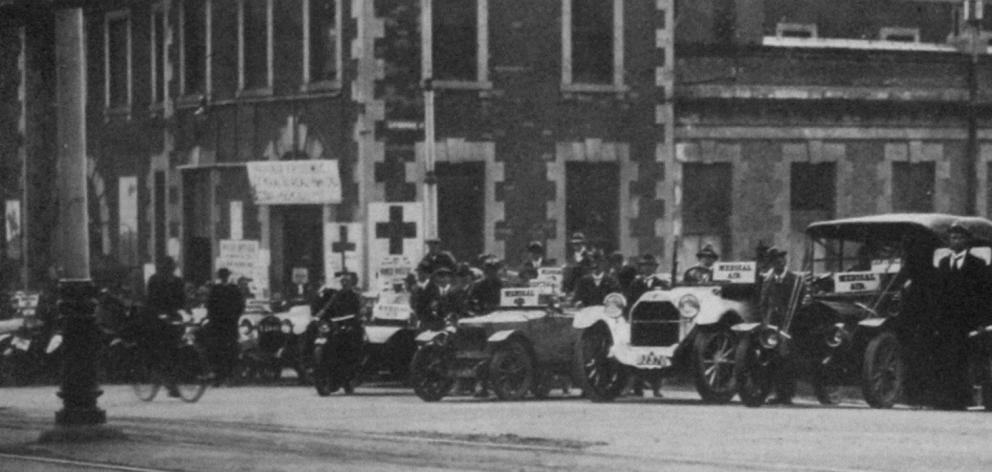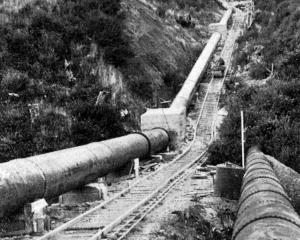
The reports generally are of the most heartening description. Nursing is still as urgently required as ever, but that does not mean that the worry that has fallen on the community is not being lifted from its shoulders. Dr Bowie informed a Daily Times reporter yesterday that not only had the admissions to the Public Hospital grown appreciably less compared with a week ago, only 17 patients having been admitted on Sunday as against 46 seven days previously, but the later cases admitted were, generally speaking, of a milder type. A fair proportion of the patients recently admitted come from the outlying country districts, notably Seacliff. The number of notifications received at the office of the District Health Office at 9 a.m. yesterday also showed a marked decrease, the total for the Otago, Southland and Waitaki hospital districts being 30 — five from Waitaki, 19 from Otago, and six from Southland — and as the figures represent practically the returns for two days, the report is of a most encouraging nature.
Quarantine Island hit
The Military Hospital at Quarantine Island, of which Major Gairdner is in charge, has felt the full force of the epidemic. No fewer than 50 men contracted influenza, and 16 of these developed pneumonia. All of the guard went down but one, and all the Medical Corps except three.
The claims upon Sergeant-major Belworthy and his helpers were severe. They speak gratefully of the loyalty of the hospital patients, who lent timely and efficient service day and night till the crisis was over. They desire to acknowledge also the good offices of friends outside.
The Red Cross and Patriotic Societies of Dunedin and Port Chalmers furnished welcome comforts, and the gifts of others were brought by the chaplains.
Efficient help was rendered by Mrs Adams, of the Hatchery, Portobello, and by the Hawke’s Bay worker, Mrs Fitzherbert, who has been the friend of the patients on Quarantine Island ever since the opening of the current hospital.
Praise for volunteers
Sir, I think some public acknowledgement should be made of the tremendous debt the community owes to the men and women who in various ways have worked so heroically in combatting the present epidemic. Both in the country districts and in Dunedin many of the V. A. D.’s have devoted every atom of their strength to the work, and have laboured on till they themselves were laid aside. — H. O. Fenton.
Doing his duty
The other day a little lad walked into the Auckland Records Office (says the Star). He told the young lady he wanted to make arrangements about a funeral. The lady did not quite grasp the tragedy in the little fellow’s eyes. She asked him why his father did not come along. ‘‘Father’s dead,’’ the little fellow said. ‘‘And your mother?’’ ‘‘She’s dead, too.’’ The boy with his father and mother gone before, his sisters and his brothers in trouble, too, had sturdily set about doing whatever was necessary.
Eyeing phosphate deposits
WELLINGTON: Inquiries about the chances of New Zealand securing rights over the phosphatic deposits on some of the islands of the Pacific were made by Mr Newman. He understood that the Government was watching the interests of New Zealand in regard to the phosphate deposits on the island of Ngaru. He had a communication stating that the London Trading Company had acquired all the German interests in this island. If this were true it would mean that this company would make profits while the New Zealand farmer would be exploited. Mr Massey: Ngaru is German territory in British occupation, and that will be the position until the ultimate disposition of the island is settled at the Peace Conference. When my colleague and I go to Britain we propose to look after these islands at every opportunity. The honourable member can be assured that New Zealand interests will be looked after in this and every other respect. — ODT, 3.12.1918.
• COPIES OF PICTURE AVAILABLE FROM ODT FRONT OFFICE, LOWER STUART ST, OR WWW.OTAGOIMAGES.CO.NZ












